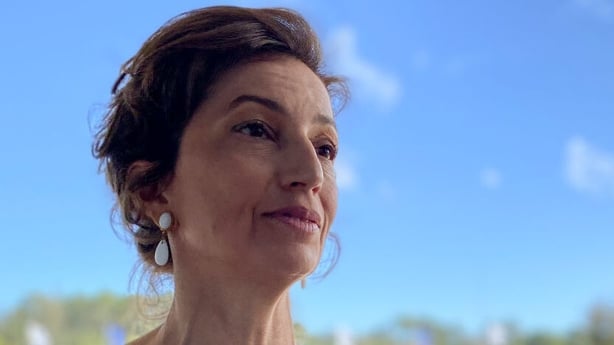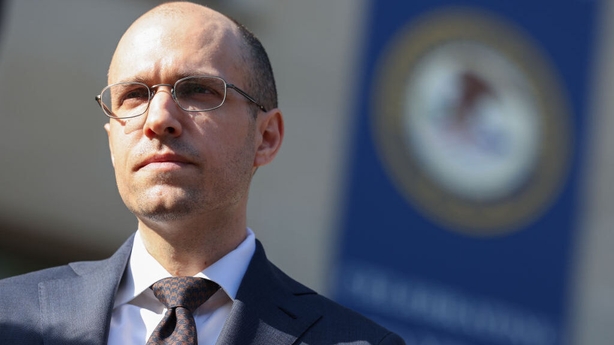The United Nations celebrates World Press Freedom today - only there is nothing to celebrate.
86 journalists were killed in 2022, making it the deadliest year for the profession, according to UNESCO, the UN agency hosting the event.
Hundreds more were attacked or jailed.
Meanwhile, intimidation and harassment of journalists in cyberspace is on the rise - particularly for female journalists - with three out of four women journalists experiencing online abuse.
The level of impunity with which crimes against journalists are committed sends a chilling message, Audrey Azoulay, Director-General of UNESCO, told a special meeting at the General Assembly.
"The security of journalists is not a matter just for journalists or international organisations. It is a matter for society as a whole.
"The assault on the free press comes at a time when independent journalism is needed more than ever.
"We find ourselves at a new crossroads," she said. "Our current path is leading us away from informed public debates. Away from the very notion of a shared reality on which it depends. A path towards ever more polarisation."

In a video message, the UN Secretary-General - who attended a meeting in Doha where the erosion of freedoms in Afghanistan were on the agenda - said that a free press was the foundation of democracy and justice.
"Press freedom represents the very lifeblood of human rights. But in every corner of the world, freedom of the press is under attack.
"Stop the threats and attacks. Stop detaining and imprisoning journalists for doing their jobs. Stop the lies and disinformation. Stop targeting truth and truth-tellers," Mr Guterres said.
Chairman and publisher of the New York Times, AG Sulzberger, followed with a stark message to the General Assembly meeting, that the future of global stability depended on independent journalism.
"Without journalists to provide news and information that people can depend on, I fear we will continue to see the unravelling of civic bonds, the erosion of democratic norms and the weakening of the trust - in institutions and in each other - that is so essential to the global order," he said.
The free press is often the first casualty in the demise of democracy, he added, noting the rise of authoritarian regimes.
"When the free press erodes, democratic erosion almost always follows.
"All over the world autocrats and those who aspire to join their ranks have used censorship, media repression, and attacks on journalists to consolidate power. That's because gaining control of information is essential to gaining control of everything else."
"Spin the globe and you’ll find examples of these trends," Mr Sulzberger said.
In China journalists are surveilled, intimidated and jailed, he said, while in Hungary the government introduced laws to gain near-total control over the press.
Mr Sulzberger called for the release of his former New York Times colleague, Evan Gershkovich, now a reporter with the Wall Street Journal, who was arrested in Russia on "sham charges".

Mr Sulzberger also drew attention to countries where press freedoms were traditionally strong, like the United States, where journalists now face "systematic campaigns to undermine their credibility followed by attacks on the legal protections that safeguard their work".
He said an attack on independent journalism amounted to an attack on the "public’s right to know" and called on members states to stand up for press protection.
But he said, that would not be enough because independent journalism lacks a "clear financial model", citing the shuttering of local newspapers and the loss of their investigative teams, as revenue streams have shifted to digital platforms over the past 30 years.
According to a joint UNESCO/Economist Intelligence Unit report, just two internet companies - Google and Meta - now receive approximately half of all global digital advertising spending.
Asked by RTÉ News how the UN proposes to tackle the crisis in journalism funding, Guilherme Canela De Souza Godoi, Chief of Section of the Freedom of Expression and Safety of Journalists at UNESCO, said there was "no one size fits all".
But he said UNESCO had looked at various models used in countries around the world such as taxpayer funding, for example, or the transfer of resources from internet companies to news media.
"UNESCO is saying that it is absolutely urgent that we discuss ways to keep the news media viability because journalism is so essential for our society," he said.
Ireland second in press freedom index
Ireland has risen to second in the World Press Freedom Index, which evaluates the environment for journalism in 180 countries and territories and is published on World Press Freedom Day.
The index, compiled annually by Reporters Without Borders (RSF), is topped by Norway for the seventh year running. Ireland is up four places at 2nd, with Denmark ranked in third. The UK is in 26th, while the United States is in 45th position.
The last three places are occupied solely by Asian countries: Vietnam, China and North Korea.
In its analysis, RSF describes the situation as 'very serious' in 31 countries, ‘difficult’ in 42, ‘problematic’ in 55, and ‘good’ or ‘satisfactory’ in 52 countries.
Christophe Deloire, RSF Secretary-General, said: "The World Press Freedom Index shows enormous volatility in situations, with major rises and falls and unprecedented changes, such as Brazil’s 18-place rise and Senegal’s 31-place fall.
"This instability is the result of increased aggressiveness on the part of the authorities in many countries and growing animosity towards journalists on social media and in the physical world.
"The volatility is also the consequence of growth in the fake content industry, which produces and distributes disinformation and provides the tools for manufacturing it," Mr Deloire added.
Additional reporting: Philip Bromwell







